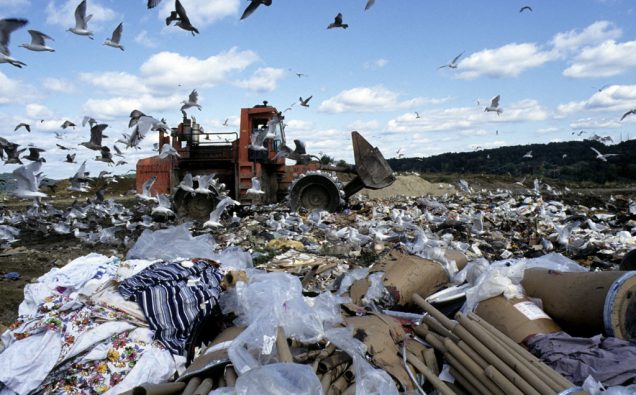
A UN file photo shows birds scavenging for food amidst the debris at the landfill in Danbury, Connecticut Credit:Evan Schneider
A stunning new report says every part of the planet and every person is affected by pollution – the world’s largest killer – and the degradation could only be stemmed with a holistic politically galvanized global approach.
Nearly a quarter of all deaths worldwide – or 12.6 million people a year – are due to environmental causes, the United Nations Environment Program (UNEP) reveals.
The health effects are stark, with air pollution alone killing some 6.5 million annually, affecting mostly poor and vulnerable people, according to The 2017 Executive Director’s Report: Towards a Pollution-Free Planet
In a precarious warning, the report notes that ecosystems are also greatly damaged by coastal, wastewater and soil pollution. The vast majority of the world’s wastewater is released untreated, affecting drinking water to 300 million people.
PROGNOSIS
“While solutions are within reach, new policies, enhanced public and private sector leadership, redirected investments and massive funding are all desperately needed, the United Nations Environment Programme (UNEP) has said.
Pollution has significant negative impacts on human health and ecosystems, according to UNEP’s most comprehensive assessment ever.
The report urges political leadership at all levels, high-level champions and commitments to achieve a pollution-free planet.
The assessment coincides with new levels of environmental hazards like smog enveloping cities, and the breathing problems that afflict people around the world.
Unveiled Thursday by UNEP Executive Director Erik Solheim, the report analyzes impacts on human health and ecosystems brought on by air, land, freshwater, marine, chemical and waste pollution.
“It provides a clearer picture than ever before of the scale of the pollution menace – and the scale of action that will be needed,” he said.
“None of us is now safe, so now all of us have to act.”
![By Mikael Häggström. When using this image in external works, it may be cited as: Häggström, Mikael (2014). "Medical gallery of Mikael Häggström 2014". WikiJournal of Medicine 1 (2). DOI:10.15347/wjm/2014.008. ISSN 2002-4436. Public Domain. or By Mikael Häggström, used with permission. [Public domain], via Wikimedia Commons](https://www.viewsnews.net/wp-content/uploads/2017/11/Health_effects_of_pollution-1024x727.png)
Photo: Mikael Häggström(2014). “Medical gallery of Mikael Häggström 2014”. WikiJournal of MedicinePublic Domain. /Wikimedia Commons
WHAT IS THE PRESCRIPTION?
A series of direly needed steps are needed. Implementation, knowledge, infrastructure, limited financial and industry leadership, pricing and fiscal, and behavioural are listed as five main gaps that limit the effective actions.
“What makes this report different is the breadth of its analysis and the new ambition of its solutions,” explained Solheim.
Five key messages to advance towards the goal of a pollution-free planet are:
political leadership and partnerships at all levels, mobilizing the industry and finance sectors;
action on the worst pollutants and better enforcement of environmental laws;
Sustainable consumption and production, through improved resource efficiency and lifestyle changes, better waste prevention and management;
Investment in cleaner production and consumption to counter pollution, alongside increased funding for pollution monitoring and infrastructure to control pollution; and
Advocacy to inform and inspire people worldwide.
Environmental governance, also spotlighted in the report, is a key enabler to achieve the Sustainable Development Goals (SDGs).
THE SURVIVAL PATHWAY
“The only answer to the question of how we can all survive on this one planet with our health and dignity intact is to radically change the way we produce, consume and live our lives,” said Ligia Noronha, one of UNEP’s coordinators for the Report.
According to the United Nations, the future steps include convening of a third UN Environment Assembly from 4-6 December in Nairobi, Kenya, where UNEP is headquartered.
The assembly is the world’s highest-level decision-making body aimed at engaging high-level participation to tackle the global threat of pollution.
OVERRIDING QUESTION ?????
But the question facing the world beset with divisive rhetoric and misplaced priorities remains: Will we act swiftly enough to stem the rot?

















